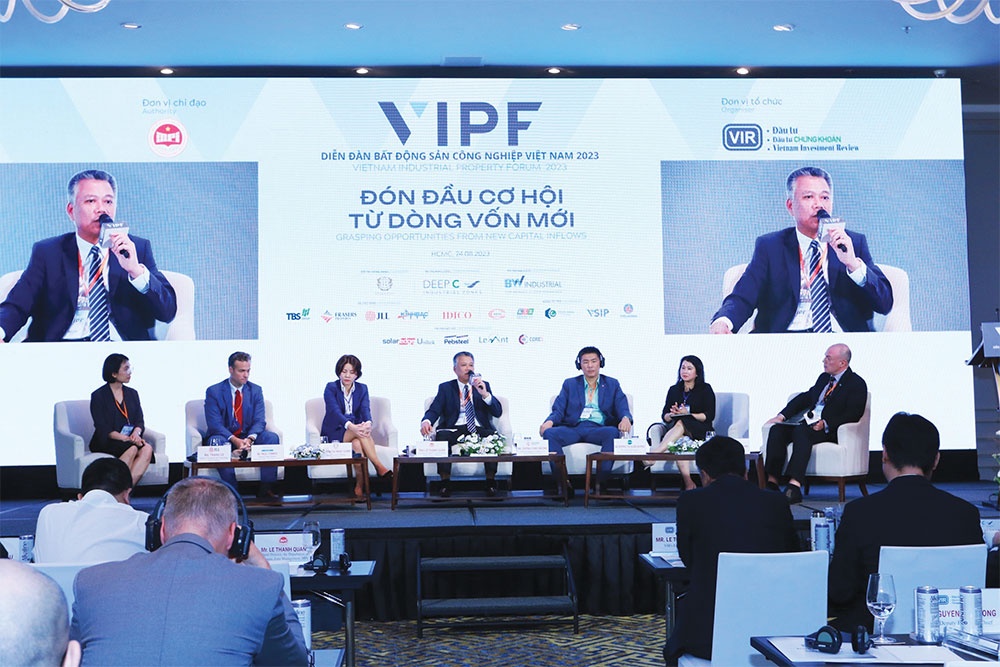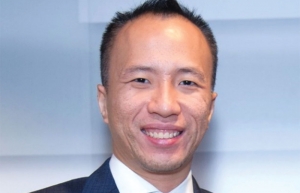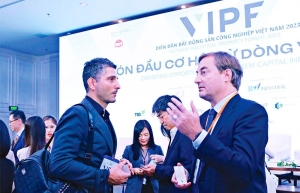ESG becoming a benchmark for IZs
 |
| Business leaders debated the likely trends for industrial real estate in Vietnam and beyond, photo Le Toan |
Deputy CEO of KN Holdings, Ton Thi Nhat Giang, shared her insights into the intricate maze of environment, social, and corporate governance (ESG) challenges within the industrial real estate sphere at VIR’s Vietnam Industrial Property Forum 2023 in Ho Chi Minh City last week.
“Realising the ESG benchmark is an intricate dance, fraught with complexities,” Giang said.
Zooming in on the environmental facet, energy development stands out as a significant hurdle. Giang spotlighted an intriguing paradox: while the government has unrolled its national power plan, there still exists a lack of clarity in translating the blueprint into tangible, efficient energy sources. This opacity stunts the growth of renewable energy in industrial zones (IZs), making the field a tricky terrain for investors.
“We have a situation where partners, enthusiastic about backing green initiatives, are left in limbo due to unclear mechanisms when they wish to enter contracts with renewable energy developers,” Giang said.
The global theatre further complicates the narrative. With Europe’s October move to implement cross-border carbon taxes, Vietnamese enterprises, including those in real estate, face heightened import costs that could ripple through to consumer prices.
However, the social responsibility aspect is equally pressing. Giang discussed the paramount importance of ensuring the wellbeing of the workforce within IZs. The narrative converges on the pressing issue of social housing.
For Giang, the challenge lies not just in creating housing, but in making it truly accessible and sustainable for the workers it’s meant for. “The housing sector’s policies can be a double-edged sword. While they aim to uplift worker lives, they need to be meticulously crafted to encourage real investment,” she said.
Pivoting to sustainability, Trang Le, head of Research and Consulting at JLL Vietnam, emphasised the transformative stance on ESG factors.
“While merely the location defined the competitive edge for IZs five years ago, today’s players differentiate themselves with ESG-driven value-added services for manufacturers,” she said at the forum. “Previously seen as a ‘nice to have’, ESG is now a non-negotiable. Foreign investors now underscore the urgency to embrace ESG swiftly, lest the associated costs become prohibitively expensive.”
Moreover, ready-to-occupy assets like pre-built warehouses and factories, underpinned by strong ESG foundations, could prove more attractive.
Furthermore, the scope of investment is diversifying beyond the major cities. Land costs and the availability of labour are crucial, but the sustainability ethos is the new drawcard.
Le highlighted a pivotal trend emerging in Vietnam’s property landscape, pointing to provinces with affordable land prices as the next epicentres of sustainable investment. While she has not zeroed in on exact locations, Le sees untapped potential, particularly in the North Central Vietnam and northern region provinces.
“Around 5-7 years ago, our clientele primarily sought prospects in hubs like Ho Chi Minh City and Hanoi. But the winds of change are evident as interest now spreads to lesser-known cities, all steered by ESG imperatives,” Le said.
“Future trends in industrial real estate development echo current practices, but with a pronounced ESG accent,” she added. “Modernisation, enhanced construction quality, and, crucially, sustainability practices are becoming key attributes.”
Linking this trend to tangible shifts in energy sourcing, the appetite for green energy is palpable, especially in the industrial heartlands.
Le Hong Khanh, deputy director of Binh Duong Power Company, offered a case in point. He emphasised the burgeoning demand for rooftop solar solutions in the province. Preliminary data from his unit indicates at least 26 businesses have registered for solar installations, amounting to a combined capacity of a whopping 60MW.
“Should the authorities lay down a clear framework championing rooftop solar ventures, Binh Duong could well be at the vanguard of this transformation, given the visibly pent-up demand,” Khanh said.
On a similar note, Bui Trung Kien, deputy CEO of Ho Chi Minh City Power Corporation, acknowledges the rising trend of businesses in the city’s IZs and export processing zones leaning towards rooftop solar installations. While management boards are supportive, the core issue is to establish policies that enable businesses to utilise the installations for their operations.
Kien that while there are policies in the pipeline, businesses are clamouring for a prompt mechanism to hasten installations. “Besides that, there should be policies and mechanisms to incentivise investors to set up energy storage systems, ensuring power stability with backup electricity sources,” Kien added.
A director from the textile industry, which is undergoing a challenging year, voiced a similar sentiment. According to him, competition criteria for securing orders nowadays is not solely price or product quality; it also involves green certifications. Hence, textile enterprises need to invest in green standards to clinch every order. However, the lack of a policy framework acts as a barrier for businesses wanting to self-install rooftop solar systems.
“Adopting renewable energy will help reduce costs, grant green certifications for products, and enhance competitiveness in the international market. We eagerly anticipate a prompt mechanism for businesses to install rooftop solar systems,” the representative said.
 | Regional collaborations can improve prospects for ESG Environmental, social, and governance criteria are not merely a hot trend, but a development goal of many enterprises. Benjamin Soh, founder and managing director of STACS, discussed the considerations with VIR’s Minh Dat. |
 | Big deals making a mark within industrial real estate The trend of shifting supply chains to key destinations, including Vietnam, has provided an opportunity for the country to attract foreign capital flows and become a focal point of the industrial real estate sector. |
 | Robust answers can ensure new industrial capital flows Although foreign investment is generally on a downward trend globally, Vietnam continues to be assessed as a bright spot for inflows, particularly in industrial real estate. |
What the stars mean:
★ Poor ★ ★ Promising ★★★ Good ★★★★ Very good ★★★★★ Exceptional
Related Contents
Latest News
More News
- Saigon Centre gains LEED platinum and gold certifications (February 12, 2026 | 16:37)
- Construction firms poised for growth on public investment and capital market support (February 11, 2026 | 11:38)
- Mitsubishi acquires Thuan An 1 residential development from PDR (February 09, 2026 | 08:00)
- Frasers Property and GELEX Infrastructure propose new joint venture (February 07, 2026 | 15:00)
- Sun Group led consortium selected as investor for new urban area (February 06, 2026 | 15:20)
- Vietnam breaks into Top 10 countries and regions for LEED outside the US (February 05, 2026 | 17:56)
- Fairmont opens first Vietnam property in Hanoi (February 04, 2026 | 16:09)
- Real estate investment trusts pivotal for long-term success (February 02, 2026 | 11:09)
- Dong Nai experiences shifting expectations and new industrial cycle (January 28, 2026 | 09:00)
- An Phat 5 Industrial Park targets ESG-driven investors in Hai Phong (January 26, 2026 | 08:30)

 Tag:
Tag:




















 Mobile Version
Mobile Version